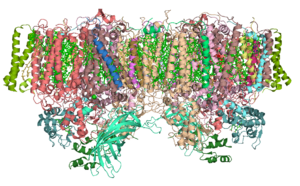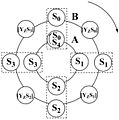Photosystem II facts for kids
Photosystem II is a super important part of how plants, algae, and tiny ocean creatures called cyanobacteria make their own food. It's the first big step in a process called light-dependent reactions, which are the first part of photosynthesis.
This amazing group of special proteins is found in the thylakoid membranes inside plant cells and similar structures in algae and cyanobacteria. Think of these membranes as tiny energy factories!
Contents
What is Photosystem II and How Does It Work?
Photosystem II is like a tiny solar panel inside cells. Its main job is to capture sunlight and use that energy to power the first steps of photosynthesis.
Capturing Light Energy
Inside Photosystem II, there are special proteins called enzymes. These enzymes are experts at catching tiny packets of light energy, which we call photons. When a photon hits Photosystem II, it gives energy to tiny particles called electrons.
Moving Electrons and Splitting Water
Once the electrons get energized, they don't stay put! Other helper molecules, called coenzymes and cofactors, move these energized electrons along.
But where do the electrons come from? Photosystem II has a clever trick: it splits water molecules! This process is called photolysis. When water (H₂O) is split, it creates:
- New electrons to replace the ones that just got energized and moved away.
- Hydrogen ions (tiny parts of hydrogen).
- Oxygen gas (O₂), which is what we breathe!
Why Photosystem II is So Important
By constantly splitting water, Photosystem II makes sure there's always a fresh supply of electrons. These electrons are absolutely vital for the rest of the photosynthesis process to happen. Without Photosystem II, plants and other organisms wouldn't be able to turn sunlight into the energy they need to grow, and we wouldn't have the oxygen we need to live!
Images for kids
-
Water-splitting process: Electron transport and regulation. The first level (A) shows the original Kok model of the S-states cycling, the second level (B) shows the link between the electron transport (S-states advancement) and the relaxation process of the intermediate S-states ([YzSn], n=0,1,2,3) formation




